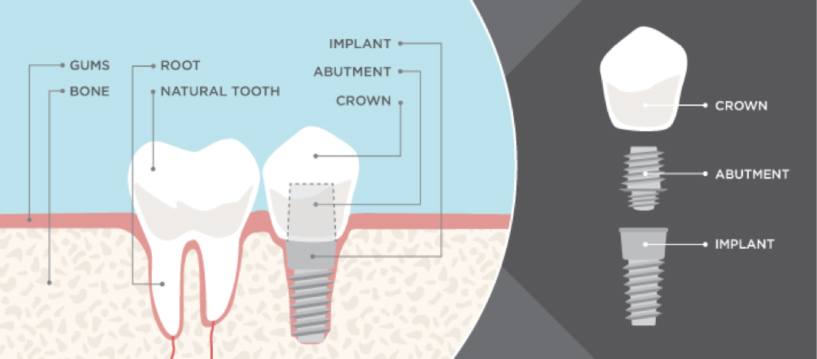A dental implant is a special metal (titanium) substitute for a natural root used to replace a missing tooth. Each implant is carefully placed into a socket drilled at the precise location of the intended tooth. If an implant has a screw-thread on its outer surface, it can be screwed into position.
The primary aim during installation of any implant is to achieve close contact with the surrounding bone.
This creates stability which over time is steadily enhanced by further growth of bone onto the implant.
Most implants are coated with special material that enhances the bond with the surrounding bone, enhancing the success of the procedure.
Once the implant has stabilised, this component provides the foundation for support of the teeth (crowns, bridges or dentures)

Dental implants can also give stability to dentures, a procedure called All-on-Four. In this procedure, an arch of dentures is secured to the jawbone with just four dental implants. Many people prefer to have this procedure as it eliminates “slipping”, improves quality of life and enhances confidence.
Yes, as long as you have a healthy mouth and are generally fit and well. Stable medical conditions, e.g. diabetes or high blood pressure, do not prevent you from having implant treatment. Your dentist will assess the state of your teeth and gums to make sure that you are suitable for this treatment. If you have noticed any bleeding from your gums, bad breath, or abscesses then these will be treated before considering you for implants. Another factor is bone loss. If your jawbone has thinned or has lost some volume, then it may be necessary to replace that loss before inserting an implant. This will be discussed with you at your consultation with our Implant specialist. Your lifestyle, state of health and reasons for treatment will all be taken into account during the consultation. A good candidate for treatment is one who is healthy, is prepared to look after their teeth and visit the dentist for regular checkups.
Some people are not good candidates for dental implants. This includes women who are pregnant, or anyone who is a heavy smoker and/or drinker, suffering from an unstable medical condition such as uncontrolled diabetes or high blood pressure, prone to grinding teeth, or has cancer. There may be other options available to you, so please ask your dentist. If you are under 19 or your jawbone is not fully grown then implants are not advisable. However, each case is considered by its own merits. If your dentist feels that you are not suitable for implants, then he/she will be able to recommend an alternative.
Generally, there is very little that can go wrong with a dental implant. Any problems are likely to be those of rejection – when the implant refuses to fuse with the jawbone, for example. These issues will be dealt with by your Implantologist with careful discussion with you. You will be in our care throughout your entire treatment.
The procedure itself is painless as it is generally carried out under a local anaesthetic. You may feel some discomfort once the anaesthetic has worn off but this will ease after a few days. You may notice some swelling and your jaw may show some ‘black and blue’ bruising but this will disappear. Any pain is likely to be in your jaw and gums which will be sore after treatment. There may be a dull ache for a few days afterwards but the Implantologist will prescribe pain relief medication to control this if required.
Our Implantologists are registered as Specialists on the General Dental Council (GDC), or have a special interest in placing and restoring Implants. They have spent several additional years studying this specialty after finishing their dental degree (postgraduate training). Failed cases/Patients unsatisfied with their treatment can undertake specialist advice for treatment and subsequent correction with our team.
Our Implantologists are at the cutting edge of their field. Guided implant placement involves using the latest in CT scanning technology and computer software to precisely place your implant in the best possible area for the success of the procedure. It often eliminates the need for additional surgical procedures and therefore lessens the overall time for the completion of treatment, lessening the procedure, thus less pain overall.
The main benefits of using computer-guided surgery include precise and accurate implant placement. The ability to visualise vital anatomical structures allows your dentist to better preserve them during guided surgery. Often the time required for implant surgery can be substantially reduced, which is of great benefit to the patient. Our Specialist dentist has successfully treated many patients using the guided surgery with fantastic results.
The dental implant procedure can be performed as a single same-day insertion. It can also be accomplished as a two-stage process. In some cases, we see the patient for 6 weeks after their implant. In other cases, we see the patient for 6 months or more. This will depend on the treatment that is best for your situation
If you need a bone graft, this means we will take bone from either your chin or hip and graft the bone onto your jawbone to increase its depth. If your dentist has advised you to have a bone graft, this can be done either before or during the implant treatment. A bone graft can make a positive change in your appearance. If your jaw has experienced bone loss caused by missing teeth, ageing, or prolonged denture wear, then you may have experienced facial ‘shrinkage’ which can impact your appearance. A bone graft can replace that bone loss caused and give you a younger look. If you are considering an implant in your upper jaw, you may require a procedure called a sinus lift. This involves grafting bone onto the jaw within the sinus area to increase its volume.
After you have had the bone graft, the next step involves inserting the implant. In some cases, this is done as an ‘all in one’ procedure. You will have the bone graft first, then the implant insertion afterward in the same procedure. The ‘two stage process’ is the preferred procedure. It will involve the insertion of an implant in one procedure. When that has healed, it will be followed by a second procedure in which the replacement tooth is attached to the implant.
The dentist will make an incision within your gum to expose the jawbone. He or she will then drill a small hole within the jaw, ready for the implant. The implant can either be the screw or cylinder type and is inserted into the jaw. The incision is closed via a series of tiny stitches and allowed to heal. This is usually a period of 3 months or more. This will allow the implant to integrate with the jawbone. There are several brands of implants – Straumann, Bicon and IMTEC. Another option is that of the ‘mini’ implant. These tend to be used as a temporary measure, before being replaced by the normal standard implants. They are often used in cases where the patient is in poor health, reluctant to have the full implant, or to stabilise their dentures.
Integration period is a period of time in which your jaw (and gum) is given time to heal. This can take from 3 months and during that time the aim is for the implant and jaw to fuse together. This is a natural process and one that it is usually successful. This period of time is known as ‘osseo-integration’. During this period you have the option of either wearing a temporary denture or a simple dental bridge to replace the missing teeth on a temporary basis.
When your jaw has healed, it is time to install the replacement tooth or teeth. These are also known as restorations. The dentist will open up the original incision. He or she will then fit a small collar onto the end of the implant called an ‘abutment’. This abutment allows the dentist to fit the replacement teeth to the implant. You can have a single implant, a bridge or an overdenture. The implant procedure can form part of a larger body of work such as a crown and bridge restoration – or a major reconstruction. The restorations are made by a specialist dental laboratory in cooperation with your dentist.
After your implant, you must have regular check-ups with your dentist. This is to monitor your progress and to monitor whether the implant is functioning well. Your dentist will also check your bone levels and your gum health. You will also be required to attend the hygienist regularly to maintain the health of your implants. When you maintain good oral hygiene at home and with dental visits, your implants can last a very long time.

